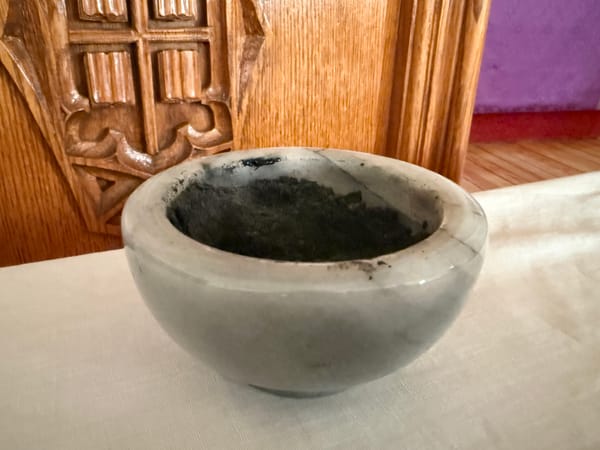The Foreigner as Teacher, Never Threat
“Jesus, Master, have mercy on us,” for not knowing enough modern-day lepers. Lead us into those relationships, that we may learn from them and love.

October 12, 2025 - The Eighteenth Sunday after Pentecost
My friends, I speak to you today in the name of one God, Father, Son, and Holy Spirit. Amen. Please be seated.
Good morning, Epiphany. I think I rode the high of last Sunday’s service through most of my work here as your priest this week. Baptisms and blessings are among the best of what the church has to offer: inclusion, reminders of the presence of God. You were all so gracious, welcoming visitors, babies, and animals into this place last week. Thank you.
This Sunday’s service has a little less pageantry, and though I often try to avoid doing this overtly, my sermon this morning is going to dive into some hot-button political issues. They feel unavoidable after you read this morning’s gospel, the story of Jesus and the ten lepers, especially if you have any eye at what’s been going on in Broadview, Illinois, in Portland, Oregon, and elsewhere in our country in the last year. For those who urge me to keep politics out of my preaching, well, brace yourself. Try to hear the good news of the gospel this morning, and please know, I’m always open for conversation. I would much prefer that to quiet grumbling or someone I love leaving here upset today.
I want to ease into it, then, by talking about sports. Ha. This last 48 hours saw the Tigers and the Cubs both get knocked out of the baseball playoffs, and both Michigan and Michigan State lost to college football teams from southern California yesterday, so sports have been a bit rough for our neck of the woods this weekend. I’ve been especially tuned into the world of sports since my childhood; I remember watching the Super Bowl with friends in our church fellowship hall when I was about Nora’s age, and of course, I spent years as a sportswriter in Charlotte while working as a stay-at-home dad. This next year’s Super Bowl halftime show was a focus of headlines this week, maybe some of you noticed this. The performer selected for Super Bowl 60 is none other than Bad Bunny, a favorite around here I’m sure... you all probably have each one of his albums on vinyl.
Actually, no, I would guess that very few of you had heard of Bad Bunny before this week. He is a Puerto Rican rapper and singer dubbed “the King of Latin Trap Music,” and his lyrics are in Spanish. Lily and I listened to a bit of him on our daily drive to school this week, and then we switched it back to the classical radio station... it wasn’t for us. What we did not do, however, as should be obvious and normal and expected, we did not demand that Bad Bunny be taken off the radio because he was singing in Spanish.
Yet after he was awarded the coveted spot as the Super Bowl halftime performer, many conservative Christian organizations and podcasters and social media celebrities in our country demanded that Bad Bunny be replaced. He wasn’t “American” enough for them. Turning Point USA, founded by the late Charlie Kirk, well they announced they would be hosting an “All-American Halftime Show” as counter programming, for all the “real” Americans to tune into. Lee Greenwood, of “God Bless the USA” fame, has been floated as a possible alternative by the Speaker of the House. The public critique here, probably not surprising anymore, is that Bad Bunny, a Puerto Rican Catholic who sang in a church choir until he was 13, Bad Bunny is just not American enough nor Christian enough to be a representative on one of our biggest cultural stages. Puerto Rico, I remind you, is still part of the United States, and Catholicism, well, it’s kind of the world’s largest Christian tradition... but who needs facts these days. The quiet part is getting far less quiet, friends.
Let’s put the Super Bowl and the bewildering and heartbreaking Bad Bunny debate aside for a moment. Also this week, several clergy and Christians and other Americans have been protesting in Broadview, Illinois, protesting ICE’s treatment of anyone who looks like they might not be a citizen. That definition is as broad as ICE likes, and citizens are now being detained daily in brutal raids. Members of the media are being threatened and assaulted. A priest in Broadview was shot in the head with a pepper ball while praying; you can hear the ICE agents laughing. All of the red flags are raised, all of the alarms, they are now going off. There should be no sugar-coating this or hiding from it anymore. Broadview is not far away, y'all.
So, where is the good news this morning, preacher? Well, honestly, we might not want to go straight to the good news. We might need to sit with the red flags and alarms for a minute. Our distance and our privilege may keep us from realizing the flags are raised, the alarms are going off, for anyone in this country who does not look like or speak like or love like those in power do. If we aren’t aware of that yet, let us have ears to hear and eyes to see it this morning. But, yes, you’re in church, yes... where is the good news?
I’m going to argue this morning that there is good news for this very situation, for us in this nation, right now in this gospel text, with the healing of the ten lepers. This is a short story, only nine verses in Luke’s 17th chapter, and it may seem here that Jesus is just cranky, ungrateful. One of the commentaries I read sarcastically called this “the story of Jesus and his thankless job.” But I don’t think he is ungrateful, here; I think he is making a point to his followers. This is the only time the word “foreigner” appears in the gospels. We are familiar with the Samaritans thanks to the parable of the Good Samaritan, of course, but it is clear that of the ten lepers who are healed, only one of them comes back to praise God, to thank Jesus, and it is not the person the religious of the day might have expected. It is the foreigner, the one outside the usual circle of inclusion, the one that some around Jesus probably thought did not deserve to be healed. It is the foreigner.
In this brief story, we have a few interesting and important nuggets, tiny takeaway lessons. The lepers, either those suffering from leprosy or some other ailment that made them untouchables, outcasts in society, these ten lepers approach Jesus and ask him for mercy... which Jesus immediately grants, no expectation, no explanation, no groveling needed, just... go and do the thing your religion may have you do, and you’ll be made clean on the way. There’s just so much grace there. There’s something here too contrasting being healed from your malady and being made truly well, a difference between a perfectly acceptable, religious, consumer-like interaction of healing and the pronouncing of Jesus, the Son of God, that “your faith has made you well.” I think that when the Samaritan chooses gratefulness here, it brings him to another level of healing, it brings him into relationship with God, into a wellness marked by gratitude. That’s a wellness of which we would all surely benefit, thankfulness for all things as a foundation.
But I could not get past this apparent surprise of Jesus that none of the healed had returned to say thank you or to give praise to God “except this foreigner.” As I said, I don’t think Jesus was surprised, I think he was bringing attention to this fact for his disciples: the outsider of all outsiders, the foreigner among a group of lepers, he is the only one here who truly gets it, who is able to see. The foreigner is the one who is able to receive the full mercy and grace of Jesus, and they should all be learning from him.
If I am going to be blunt this morning, let me be blunt. I think, for us this morning, for the disciples, this is a story about privilege. All of us need Jesus, all of us need the gospel, all of us need healing of some kind, all of us need love. But for many here, Jesus, the gospel, healing, love... those are all almost expected... as if, if we live our lives well, love others, show up at church, etc., we will get those good things. The Christian Century sent out an email to paid subscribers this week titled “Is church relevant in the modern world?” For many of us, that may seem a fair question: maybe we need all this, maybe we don’t. God loves us, everything will work out in the end. But friends, that is not so for everyone.
For many – especially those deemed as foreigners and outcasts right now in our own nation, in our own cities and towns – for many... healing, love, legal protection, shelter, food, safety... these are not sure to be granted. These “foreigners and outcasts” may live their lives as well and “by the book” as they can and still not get those things. Of late, no matter what papers they may or may not have, people in our own country may even face direct oppression, abuse, pain, at the hands of those who cannot or will not understand the privilege they themselves have, at the hands of those focused on denying those privileges to others because of difference. For many living in the world around us, whether they will be healed, protected, and loved, these are very real questions with very unclear answers.
Friends, this morning, it is time, it is long past time, for us to reject seeing Bad Bunny as a threat, to reject seeing the immigrant as a threat, to reject seeing anyone different from us in any way as a threat... to powerfully reject seeing the foreigner as a threat and to begin to see the foreigner as our teacher. Only the Samaritan healed from leprosy was able to see Jesus for who he was. He was able to not just be healed but to be made fully well, even though he had no societal expectation for justice, no expectation of love from this Jewish prophet. There are lessons that can only be taught by the foreigner, by the outcast, by the oppressed, by the marginalized, by the poor, lessons that we cannot only read in books or hear in sermons but that must be experienced to truly change us.
Fr. Gustavo Gutierrez once provocatively said, “So you say you love the poor? Name them.” So, you say you love the poor? Name them. Can we name the poor today? Can we name a foreigner, or an outcast? Can we name someone currently threatened by a world that would rather they simply not exist, or at least, that they not be our neighbors?
I know some of us can. Friends, this church, this community of faith here today, it will always invite you into those relationships, at every opportunity. People sitting around you may not themselves be oppressed – or they may be, in ways less obvious, or they may have been oppressed in their past, I know that is true – but these people around you, at the least, they can connect you with those who are oppressed, those who are outcasts. I urge you to lean into those relationships this week, to find ways to learn the names of those different from you, and then, learn from them.
To echo the lepers, “Jesus, Master, have mercy on us,” for not knowing enough modern-day lepers, enough Samaritans. Lead us into those relationships, that we may learn from them and love, in your name.
Amen.




